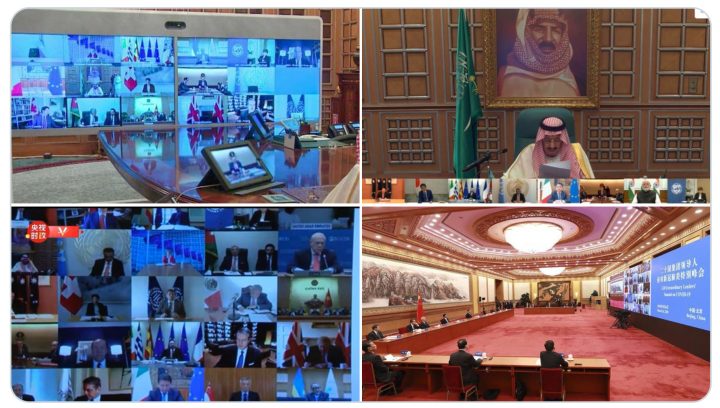“Only the most radical reset, akin to a post-world war overhaul of the international economy, will allow us to rebuild the international economy in a way which means we can tackle future pandemics.”
By Jake Johnson, staff writer – Common Dreams
Leaders of the world’s largest economies expressed confidence after a virtual G20 summit Thursday that they “will overcome” the global coronavirus pandemic, but critics said optimistic statements and vague promises will do nothing to stem the disease outbreak in the absence of immediate, coordinated, and sweeping action.
“World leaders seem in denial about the scale of the crisis,” Nick Dearden, director of U.K.-based advocacy group Global Justice Now, said in a statement following the emergency video conference, which was chaired by Saudi Arabia.
“Even in the best case scenario, in which the humanitarian crisis is contained, the global economy cannot return to the status quo ante.”
—Nick Dearden, Global Justice Now“Their desperation to get back to ‘business as usual’ is totally unrealistic,” said Dearden. “Only the most radical reset, akin to a post-world war overhaul of the international economy, will allow us to rebuild the international economy in a way which means we can tackle future pandemics, not to mention the biggest long-term challenges facing us, climate change and global inequality.”
In a joint statement (pdf) following the summit, G20 leaders said they are committed to “presenting a united front against this common threat,” even as leaders of member nations like U.S. President Donald Trump and Brazilian President Jair Bolsonaro continue to downplay the deadly virus pandemic and urge their citizens to return to work against the advice of public health experts.
Just after the event concluded, Johns Hopkins University announced that there are now more than half a million confirmed coronavirus cases worldwide.
The G20 nations vowed to coordinate on medical research and inject $5 trillion into the global economy “as part of targeted fiscal policy, economic measures, and guarantee schemes to counteract the social, economic and financial impacts of the pandemic.”
But “now is not the time to simply throw money at the very drivers of inequality and vulnerability in our economic system that COVID-19 has so profoundly exposed,” Oxfam International executive director Chema Vera wrote in a Medium post following the virtual meeting of world leaders.
“Of course, every government, institution and person must play its part,” Vera wrote. “But—as we’re all truly in all this together—we need those with the broadest shoulders to bear most of the cost. The G20 as a group of the richest countries can give billions of dollars in support to developing countries. The richest people and corporations—through greater taxation—can help pay for this.”
Echoing Vera, Dearden said “even in the best case scenario, in which the humanitarian crisis is contained, the global economy cannot return to the status quo ante.”
“Talk of ‘private sector partnerships’ are completely out of place,” said Dearden. “Only very large-scale intervention in the markets, unprecedented debt cancellation and financial reform, and massive bolstering of the public sector globally can restore employment, not to mention deal with the twin problems of inequality and climate change which present existential threats to global society.”
Global Justice Now called on G20 leaders to commit to the following demands:
- Emergency funding: A significant, coordinated emergency package to help low income and vulnerable countries deal with the crisis by building up public sector capacity, emergency welfare, and protecting jobs. Testing and treatment for all affected by COVID-19 must be provided free to those who need it and the World Health Organization needs a huge funding boost;
- Vaccine collaboration: Agree on international collaboration for a Covid-19 vaccine, which will not be patented by any one corporation or country, and will be distributed free to all who need it in every country, starting with those most at risk;
- Global green stimulus: Pledge to support a massive global stimulus package aimed at supporting green industries, rather than unconditional bailouts to the fossil fuel, aviation and other polluting industries, and with a special focus on building public healthcare systems;
- Financial reform: Initiate a process of structural financial reform including agreement on action against tax dodging, debt cancellation for countries at high-risk of debt distress, and changes to trade rules to build resilience to health emergencies.
“True, the G20 promised ‘whatever it takes,'” said Dearden, “but they currently underestimate just how big that promise needs to be.”






